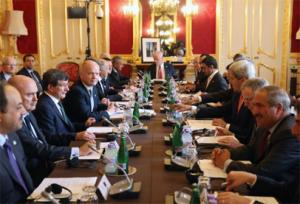Divided Syria opposition seeks unity in London
Arab and Western powers met in London on Tuesday to push Syrian opposition leaders to attend talks in Geneva next month, but President Bashar al-Assad poured cold water on hopes of any peace deal.
British Foreign Secretary William Hague said the London meeting was aimed at persuading Syria’s fractious rebels to have a “united position” for the UN-backed conference in the Swiss city, pencilled in for November 23.
A defiant Assad said however he was willing to run for re-election in 2014, a move further likely to anger a key rebel group that has so far refused to take part in the Geneva 2 conference if regime figures are present.
US Secretary of State John Kerry is at the talks in London along with Hague and counterparts from Egypt, France, Germany, Italy, Jordan, Qatar, Saudi Arabia, Turkey and the United Arab Emirates, together with Syrian opposition leaders.
“The political process, assembling a peace conference in Geneva with the participation of the regime and the opposition, is the main focus of our meeting today,” Hague told Sky News as the ministers gathered.
Notably absent from London’s meeting is key Syria ally Russia, which has dismissed such meetings in the past, saying they do not represent all Syrian people.
The Syrian National Council, a key member of the Syrian National Coalition, has already said it opposes the Geneva conference and threatened to quit the umbrella opposition group if Assad’s regime takes part.
Opposition representatives are due to meet in early November to thrash out their differences.
“We are meeting ahead of that to encourage them to have a united position, to show that those in the world among Westerners and Arab nations who understand and sympathise with their position in Syria have a united position, that they should go to the Geneva peace talks and stop the blood and talk together as Syrians,” Hague told BBC radio.
Hague also warned of the need to bolster moderate forces in Syria, where an estimated 115,000 people have been killed since March 2011 and several million more made homeless.
“The longer this conflict goes on, the more sectarian it becomes and the more extremists are able to take hold, that is why we are making this renewed effort to get the Geneva peace process going,” he said.
Kerry met with the head of the Syrian National Coalition, Ahmad Jarba, at the US ambassador’s residence in London before the main meeting on Tuesday, a spokeswoman for the US embassy said. She declined to give further details.
The United States and Russia have been trying to organise the Geneva conference on the heels of the deal they reached for the destruction of Syria’s chemical weapons in the wake of a deadly poison gas attack in August widely blamed on Damascus.
But Assad dealt an early blow to peace hopes, saying in an interview Monday that the factors are not in place for the conference to succeed.
Assad ‘has bombed and gassed his people’
“No time has been set, and the factors are not yet in place if we want (Geneva 2) to succeed,” Assad told Lebanon-based pan-Arab satellite channel Al-Mayadeen, adding that there was no guarantee about “which forces are taking part.”
Assad also gave no hint of releasing his grip on power.
“Personally, I don’t see any reason why I shouldn’t run in the next election,” Assad declared.
Kerry said the Syrian opposition would never agree to Assad staying in power.
“He has bombed and gassed people in his country… How can that man claim to rule under any legitimacy in the future?” Kerry said after talks with Arab League officials in Paris on Monday.
French Foreign Minister Laurent Fabius agreed that the meeting in London should discuss a transitional process for Syria “in which Bashar al-Assad can play no role”, according to a statement from the foreign ministry.
Hague meanwhile said Iran — Damascus’s main regional ally — could also play a role in the Geneva talks if it backed the need for a transitional government in Syria.
He said he had discussed Syria with the new Iranian foreign minister as part of warming ties between Tehran and London.
MEO


